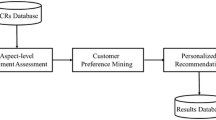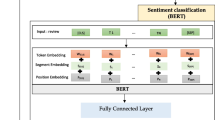Abstract
Internet applications such as Online Social Networking and Electronic commerce are becoming incredibly common, resulting in more content being available. Recommender systems (RS) assist users in identifying appropriate information out of a large pool of options. In today’s internet applications, RS are extremely important. To increase user satisfaction, this type of system supports personalized recommendations based on a massive volume of data. These suggestions assist clients in selecting products, while concerns can increase product utilization. We discovered that much research work is going on in the field of recommendation and that there are some effective systems out there. In the context of social information, sentimental analysis (SA) can aid in increasing the knowledge of a user’s behaviour, views, and reactions, which is helpful for incorporating into RS to improve recommendation accuracy. RS has been found to resolve information overload challenges in information retrieval, but they still have issues with cold-start and data sparsity. SA, on the other hand, is well-known for interpreting text and conveying user choices. It’s frequently used to assist E-Commerce in tracking customer feedback on their products and attempting to comprehend customer needs and preferences. To improve the accuracy and correctness of any RS, this paper proposes a recommendation model based on a Hybrid Recommendation Model (HRM) and hybrid SA. In the proposed method, we first generate a preliminary recommendation list using a HRM. To generate the final recommendation list, the HRM with SA is used. In terms of various evaluation criteria, the HRM with SA outperforms traditional models.












Similar content being viewed by others
Availability of data and materials
Not applicable.
Code availability
Not applicable.
Change history
01 April 2024
This article has been retracted. Please see the Retraction Notice for more detail: https://doi.org/10.1007/s10660-024-09846-1
References
Aaron, O. “What is the future of Ecommerce? 10 insights on the evolution of an industry.” Shopify Plus, 31 January 2019.
Shareef, S. M., & Hashim, S. H. (2020). Proposed hybrid classifier to improve network intrusion detection system using data mining techniques. Engineering and Technology Journal, 38, 6–14.
Zhang, H., Kong, X., & Zhang, Y. (2021). Selective knowledge transfer for cross-domain collaborative recommendation. IEEE Access, 9, 48039–48051.
Hanafizadeh, P., Firouzabadi, M. B., & Vu, K. M. (2021). Insight monetization intermediary platform using recommender systems. Electronic Markets, 31, 1–9.
Shafqat, W., & Byun, Y. C. (2020). A context-aware location recommendation system for tourists using hierarchical LSTM model. Sustainability, 12, 4107.
Kang, L., Liu, S., Gong, D., & Tang, M. (2021). A personalized point-of interest recommendation system for O2O commerce. Electronic Markets, 31, 253–267.
Wang, Y.; Sharma, R. Design of front-end for recommendation systems: Towards a hybrid architecture. In Proceedings of the 18th International Conference on Electronic Business, Guilin, China, 2–6 December 2018; pp. 211–220.
Li, G., Zhu, T., Hua, J., Yuan, T., Niu, Z., Li, T., & Zhang, H. (2019). Asking images: Hybrid recommendation system for tourist spots by hierarchical sampling statistics and multimodal visual bayesian personalized ranking. IEEE Access, 7, 126539–126560.
Fayyaz, Z., Ebrahimian, M., Nawara, D., Ibrahim, A., & Kashef, R. (2020). Recommendation systems: algorithms, challenges, metrics, and business opportunities. Applied Sciences, 10, 7748.
Zhuang, Y., & Kim, J. (2021). A BERT-based multi-criteria recommender system for hotel promotion management. Sustainability, 13, 8039.
BangaruKamatchi, R. S. (2019). Improvement of crop production using recommender system by weather forecasts. Procedia Computer Science, 165, 724–732.
Jaiswal, S., Kharade, T., Kotambe, N., & Shinde, S. (2020). Collaborative recommendation system for agriculture sector. ITM Web of Conferences, 32, 03034.
Dang, N. C., Moreno-García, M. N., & De la Prieta, F. (2020). Sentiment analysis based on deep learning: A comparative study. Electronics, 9, 483.
Preethi, G.; Krishna, P.V.; Obaidat, M.S.; Saritha, V.; Yenduri, S. Application of Deep Learning to Sentiment Analysis for Recommender System on Cloud. In Proceedings of the 2017 International Conference on Computer, Information and Telecommunication Systems (CITS), Dalian, China, 21–23 July 2017; IEEE: New York, NY, USA, 2017; pp. 93–97.
Keenan, M. J. S. (2018). Advanced positioning, flow, and sentiment analysis in commodity markets: Bridging fundamental and technical analysis (2nd ed.). Wiley.
Sánchez-Moreno, D.; Moreno-García, M.N.; Mobasher, B.; Sonboli, N.; Burke, R. Using Social Tag Embedding in a Collaborative Filtering Approach for Recommender Systems. In Proceedings of the 2020 IEEE/WIC/ACM International Joint Conference on Web Intelligence and Intelligent Agent Technology, Melbourne, Australia, 14–17 December 2020; IEEE: New York, NY, USA, 2021.
Aggarwal, B., Mittal, N., Bansal, P., Garg, S. (2015). Sentiment analysis using common-sense and context information. Computational Intelligence and Neuroscience 2015(30).
García-Cumbreras, M. Á., Montejo-Ráez, A., & Díaz-Galiano, M. C. (2013). Pessimists and optimists: Improving collaborative filtering through sentiment analysis. Expert Systems with Applications, 40(17), 6758–6765.
Ricci, F., Rokach, L., & Shapira, B. (2015). Recommender systems: Introduction and challenges. Recommender systems handbook (pp. 1–34). Springer.
Guimarães R., Rodrı´guez D. Z., Gerais M., Rosa R. L., Bressan G., Paulo S., Recommendation system using sentiment analysis considering the polarity of the adverb. In Consumer Electronics (ISCE), IEEE International Symposium on IEEE, 2016, pp. 71–72.
Lei, X., Qian, X., & Zhao, G. (2016). Rating prediction based on social sentiment from textual reviews. IEEE Transactions on Multimedia, 18(9), 1910–1921.
Peleja, F., Dias, P., Martins, F., & Magalhães, J. (2013). A recommender system for the TV on the web: Integrating unrated reviews and movie ratings. Multimedia Systems, 19(6), 543–558.
Alhamid, M. F., Rawashdeh, M., Al, O. H., Hossain, M. S., & El Saddik, A. (2015). Towards context-sensitive collaborative media recommender system. Multimedia Tools and Applications, 74(24), 11399–11428.
Hu, Y.; Ogihara, M. Nextone Player: A Music Recommendation System Based on User Behavior. In Proceedings of the 12th International Society for Music Information Retrieval Conference (ISMIR 2011), Miami, USA, 24–28 October 2011; pp. 103–108.
Salehi, M. (2013). An effective recommendation based on user behaviour: A hybrid of sequential pattern of user and attributes of product. International Journal of Business Information Systems, 14, 480–496.
Lin, D., Su, J. A Recommender System Based on Contextual Information of Click and Purchase Data to Items for E-Commerce. In Proceedings of the 3rd International Conference On Cyberspace Technology (Cct 2015), IEEE Xplore, Beijing, China, 17–18 October 2015; pp. 1–6.
Wang, B., Ye, F., & Xu, J. (2018). A personalized recommendation algorithm based on the user’s implicit feedback in E-Commerce. Future Internet, 10, 117.
Wang, Y., Wang, M., & Xu, W. (2018). A sentiment-enhanced hybrid recommender system for movie recommendation: A big data analytics framework. Wireless Communications and Mobile Computing, 2018, 1–9.
Kumar, S., De, K., & Roy, P. P. (2020). Movie recommendation system using sentiment analysis from microblogging data. IEEE Transactions on Computational Social Systems, 7, 915–923.
Ziani, A., Azizi, N., Schwab, D., Aldwairi, M., Chekkai, N., Zenakhra, D., Cheriguene, S. Recommender system through sentiment analysis. In Proceedings of the 2nd International Conference on Automatic Control, Telecommunications and Signals, Annaba, Algeria, 11–12 December 2017
Nimirthi, P., Krishna, P.V., Obaidat, M.S., Saritha, V. A framework for sentiment analysis based recommender system for agriculture using deep learning approach. In Social Network Forensics, Cyber Security, and Machine Learning; Springer, 2019; pp. 59–66.
Devipriya, K., Prabha, D., Pirya, V., & Sudhakar, S. (2020). Deep learning sentiment analysis for recommendations in social applications. International Journal of Scientific & Technology Research, 9, 3812–3815.
Devlin, J., Chang, M. W., Lee, K., & Toutanova, K. (2019). BERT: Pre-training of deep bidirectional transformers for language understanding. In Proceedings of the 2019 conference of the North American chapter of the association for computational linguistics: Human language technologies, (Vol. 1) (Long and Short Papers), Minneapolis, Minnesota. Association for Computational Linguistics, pp. 4171–4186
Su, X., & Khoshgoftaar, T. M. (2008). Collaborative filtering for multi-class data using Bayesian networks. Collaborative filtering for multi-class data using Bayesian networks, 17, 71–85. https://doi.org/10.1142/S0218213008003789
Pan R., Xu G. and Dolog P. (2012). Improving Recommendations. In: Tag-Based Systems with Spectral Clustering of Tag Neighbors. Park J.J., Chao H.C., Obaidat M.S. and Kim J., (Eds.,) Springer Netherlands, ISBN-10: 978-94-007-2792- 2, pp. 355–364.
Ghabayen, A. S., & Mohd Noah, S. A. (2014). Exploiting social tags to overcome cold start recommendation problem. Journal of Computer Science, 10(7), 1166–1173.
Melville, P., & Sindhwani, V. (2011). Recommender systems. Encyclopedia of machine learning (pp. 829–838). Boston: Springer.
Osman, N. A., Mohd Noah, S. A., Darwich, M., & Mohd, M. (2021). Integrating contextual sentiment analysis in collaborative recommender systems. PLoS ONE, 16(3), e0248695. https://doi.org/10.1371/journal.pone.0248695
Ghabayen, A. S., & Noah, S. M. (2017). Using tags for measuring the semantic similarity of users to enhance collaborative filtering recommender systems. International Journal on Advanced Science, Engineering and Information Technology, 7(6), 2063–2070.
Hu, F., & Zhou, Z. (2022). Information services and omnichannel retailing strategy choices of E-Commerce platforms with supplier competition. Electronic Commerce Research. https://doi.org/10.1007/s10660-022-09557-5
Zhou, L. (2020). Product advertising recommendation in E-Commerce based on deep learning and distributed expression. Electronic Commerce Research, 20, 321–342. https://doi.org/10.1007/s10660-020-09411-6
Wu, X. Q., Zhang, L., Tian, S. L., & Wu, L. (2021). Scenario based E-Commerce recommendation algorithm based on customer interest in Internet of things environment. Electronic Commerce Research, 21(3), 689–705. https://doi.org/10.1007/s10660-019-09339-6
Kundu, S., & Chakraborti, S. (2022). A comparative study of online consumer reviews of Apple iPhone across Amazon, Twitter and MouthShut platforms. Electronic Commerce Research, 22, 925–950. https://doi.org/10.1007/s10660-020-09429-w
Kashyap, R., Kesharwani, A., & Ponnam, A. (2022). Measurement of online review helpfulness: A formative measure development and validation. Electronic Commerce Research. https://doi.org/10.1007/s10660-022-09531-1
He, P., Wang, T. Y., Shang, Q., et al. (2022). Knowledge mapping of E-Commerce supply chain management: A bibliometric analysis. Electronic Commerce Research. https://doi.org/10.1007/s10660-022-09609-w
Chan, K. H., Ke, W., & Im, S. K. (2020, November). CARU: A content-adaptive recurrent unit for the transition of hidden state in NLP. In International Conference on Neural Information Processing (pp. 693-703). Springer.
Cheng, T., Koc, L., Harmsen, J., & Shaked, T. (2016). Wide and deep learning for recommender systems. In WWW, pp. 2787–2795.
He, C. T., Kan, X., M., & Chen, X. (2001). Trirank: Review-aware explainable recommendation by modeling aspects. In CIKM, pp. 285–295.
Dang, C., García, M. M., & De La Prieta, F. (2021). An approach to integrating sentiment analysis into recommender systems. Sensors, 21, 5666. https://doi.org/10.3390/s21165666
Wang, Y., Mingming, W., & Xu, W. (2018). A sentiment-enhanced hybrid recommender system for movie recommendation: a big data analytics framework. Wireless Communications and Mobile Computing, 2018, 1–9. https://doi.org/10.1155/2018/8263704
Selmene, S., & Kodia, Z. (2020, June). Recommender System Based on User's Tweets Sentiment Analysis. In 2020 The 4th International Conference on E-Commerce, E-Business and E-Government (pp. 96–102). https://doi.org/10.1145/3409929.3414744
Fu, M., Qu, H., Yi, Z., Lu, L., & Liu, Y. (2019). A novel deep learning-based collaborative filtering model for recommendation system. IEEE Transactions on Cybernetics, 49(3), 1084–1096. https://doi.org/10.1109/TCYB.2018.2795041
Son, J., & Kim, S. B. (2017). Content-based filtering for recommendation systems using multiattribute networks. Expert Systems with Applications, 89, 404–412.
Strub, F.; Gaudel, R.; Mary, J. Hybrid recommender system based on Autoencoders. In Proceedings of the 1st Workshop on Deep Learning for Recommender Systems, Boston, 15 Sept 2016; pp. 11–16.
Funding
Not applicable.
Author information
Authors and Affiliations
Corresponding author
Ethics declarations
Conflict of interest
All authors declare that they have no conflict of interest.
Additional information
This article has been retracted. Please see the retraction notice for more detail: https://doi.org/10.1007/s10660-024-09846-1
Rights and permissions
Springer Nature or its licensor (e.g. a society or other partner) holds exclusive rights to this article under a publishing agreement with the author(s) or other rightsholder(s); author self-archiving of the accepted manuscript version of this article is solely governed by the terms of such publishing agreement and applicable law.
About this article
Cite this article
Karn, A.L., Karna, R.K., Kondamudi, B.R. et al. RETRACTED ARTICLE: Customer centric hybrid recommendation system for E-Commerce applications by integrating hybrid sentiment analysis. Electron Commer Res 23, 279–314 (2023). https://doi.org/10.1007/s10660-022-09630-z
Accepted:
Published:
Issue Date:
DOI: https://doi.org/10.1007/s10660-022-09630-z




